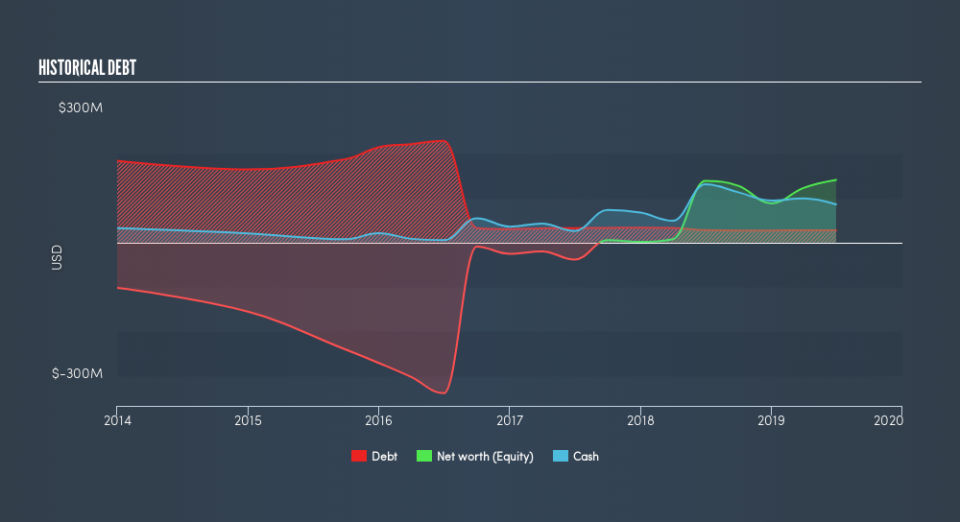Is Kadmon Holdings (NYSE:KDMN) Using Too Much Debt?

Some say volatility, rather than debt, is the best way to think about risk as an investor, but Warren Buffett famously said that 'Volatility is far from synonymous with risk.' When we think about how risky a company is, we always like to look at its use of debt, since debt overload can lead to ruin. As with many other companies Kadmon Holdings, Inc. (NYSE:KDMN) makes use of debt. But the real question is whether this debt is making the company risky.
When Is Debt Dangerous?
Debt and other liabilities become risky for a business when it cannot easily fulfill those obligations, either with free cash flow or by raising capital at an attractive price. If things get really bad, the lenders can take control of the business. However, a more frequent (but still costly) occurrence is where a company must issue shares at bargain-basement prices, permanently diluting shareholders, just to shore up its balance sheet. Of course, plenty of companies use debt to fund growth, without any negative consequences. When we examine debt levels, we first consider both cash and debt levels, together.
See our latest analysis for Kadmon Holdings
What Is Kadmon Holdings's Net Debt?
The chart below, which you can click on for greater detail, shows that Kadmon Holdings had US$27.7m in debt in June 2019; about the same as the year before. However, its balance sheet shows it holds US$86.2m in cash, so it actually has US$58.5m net cash.
How Healthy Is Kadmon Holdings's Balance Sheet?
Zooming in on the latest balance sheet data, we can see that Kadmon Holdings had liabilities of US$29.7m due within 12 months and liabilities of US$45.2m due beyond that. Offsetting these obligations, it had cash of US$86.2m as well as receivables valued at US$699.0k due within 12 months. So it can boast US$12.0m more liquid assets than total liabilities.
This short term liquidity is a sign that Kadmon Holdings could probably pay off its debt with ease, as its balance sheet is far from stretched. Succinctly put, Kadmon Holdings boasts net cash, so it's fair to say it does not have a heavy debt load! The balance sheet is clearly the area to focus on when you are analysing debt. But it is future earnings, more than anything, that will determine Kadmon Holdings's ability to maintain a healthy balance sheet going forward. So if you want to see what the professionals think, you might find this free report on analyst profit forecasts to be interesting.
Over 12 months, Kadmon Holdings saw its revenue drop to US$721k, which is a fall of 84%. To be frank that doesn't bode well.
So How Risky Is Kadmon Holdings?
Statistically speaking companies that lose money are riskier than those that make money. And we do note that Kadmon Holdings had negative earnings before interest and tax (EBIT), over the last year. And over the same period it saw negative free cash outflow of US$81m and booked a US$45m accounting loss. However, it has net cash of US$86m, so it has a bit of time before it will need more capital. Even though its balance sheet seems sufficiently liquid, debt always makes us a little nervous if a company doesn't produce free cash flow regularly. When we look at a riskier company, we like to check how their profits (or losses) are trending over time. Today, we're providing readers this interactive graph showing how Kadmon Holdings's profit, revenue, and operating cashflow have changed over the last few years.
If you're interested in investing in businesses that can grow profits without the burden of debt, then check out this free list of growing businesses that have net cash on the balance sheet.
We aim to bring you long-term focused research analysis driven by fundamental data. Note that our analysis may not factor in the latest price-sensitive company announcements or qualitative material.
If you spot an error that warrants correction, please contact the editor at editorial-team@simplywallst.com. This article by Simply Wall St is general in nature. It does not constitute a recommendation to buy or sell any stock, and does not take account of your objectives, or your financial situation. Simply Wall St has no position in the stocks mentioned. Thank you for reading.

